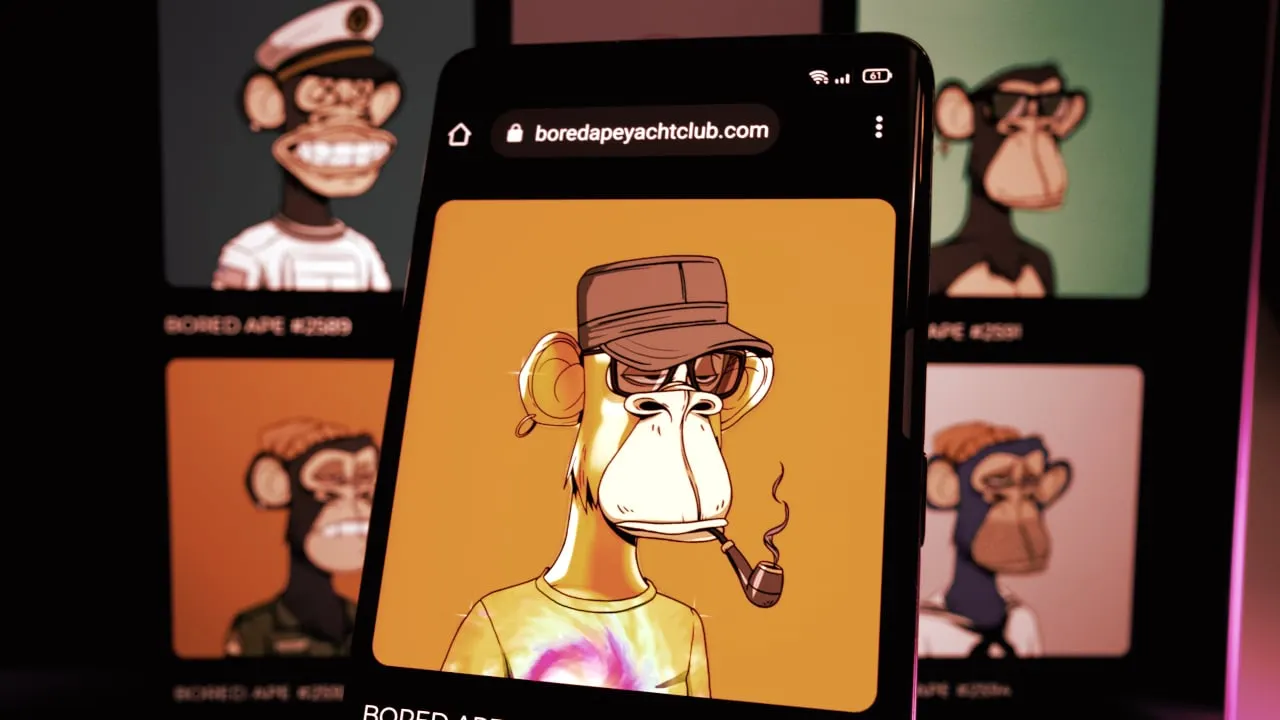In brief
- Yuga Labs’ founders defended NFT creator royalties and called out marketplaces that are rejecting them.
- They proposed a community-governed allowlist model that lets creators decide which marketplaces can handle secondary sales of their NFTs.
With top NFT marketplace OpenSea saying over the weekend that it may follow the trend of no longer enforcing creator royalties on secondary sales, more and more prominent artists and creators are making their views known. And that now includes Yuga Labs, creator of the Bored Ape Yacht Club.
In a blog post shared today by Wylie “Gordon Goner” Aronow—but also signed by his co-founders Greg “Garga” Solano and Kerem “Tomato” Atalay, along with 10KTF CTO Randy “Melonpan” Chung—Yuga decried the increasing industry moves away from honoring creator royalties, and proposed a technical solution for enforcing them.
Yuga Labs and 10KTF—a digital “tailor” that creates fashion for NFT avatars—have proposed an allowlist model that will let creators only approve secondary trades through marketplaces that honor royalties. If a marketplace’s smart contract is on the list, then a transaction will go through. If not, then it won’t. Standard wallet-to-wallet transfers would be unaffected, they wrote.
“The NFT ecosystem would be a tiny fraction of what it is today if it weren't for creator royalties,” the authors write, noting “a couple facts” at the start of the piece. “The leading marketplaces of the past couple years would be nowhere if they hadn’t supported them.”
Some thoughts on creator royaltieshttps://t.co/hKB5eQKZ93
— GordonGoner.eth (Wylie Aronow) (@GordonGoner) November 8, 2022
The founders note that when the Bored Ape Yacht Club launched in 2021 at a price around $220 worth of Ethereum apiece, Yuga set a 2.5% creator royalty on secondary sales because that’s the amount that OpenSea charged for its own marketplace fee. It’s lower than the royalty fee chosen by many other NFT creators—typically between 5% and 10% of the sale price.
“The end result has been that OpenSea has made around $35 million dollars from Bored Ape sales on its platform, not including any of our other collections,” they wrote. “We’ve never met the founders, but perhaps they have a beach house somewhere with a plaque for us.”
Yuga Labs, meanwhile, has earned more than $147 million from creator royalties on secondary sales of its various projects—including the Mutant Ape Yacht Club and Otherside metaverse game—based on data collected by Galaxy Digital in October.
However, NFT royalties as they exist today aren’t durable. They can be set by creators in the smart contract—or code that powers NFTs and autonomous decentralized apps—but they aren’t fully enforceable on-chain. Marketplaces must choose to honor them, which most of the largest players have until recently.
That’s rapidly changing. In the Solana NFT space, nearly all secondary sales now take place on platforms that either reject creator royalties or make them optional for traders, after Magic Eden did the latter after losing market share to rivals. In the Ethereum space, marketplaces like LooksRare, X2Y2, Blur, and Sudoswap have all taken that approach too.
OpenSea, the top overall NFT marketplace by trading volume, has long honored creator royalties. However, on Saturday, the firm acknowledged the changing winds in the space and said that it may ultimately make creator royalties optional for traders, along with exploring new enforcement models or perhaps only requiring royalties for certain projects.
Many prominent creators in the Web3 space haven’t taken the OpenSea news well. The Bored Ape Yacht Club founders have now joined the cause, describing the rejection of creator royalties as a “race to the bottom” that they believe OpenSea will ultimately participate in.
“OpenSea made its position clear that they intend to move with the rest of the herd and remove creator royalties for legacy collections from their platform, while keeping their trading fee the same across the board,” Yuga’s co-founders wrote, adding, “Not great.”
Yuga Labs' proposed allowlist model is the opposite of what OpenSea proposed over the weekend, which is to create a blacklist for marketplaces that do not fully honor creator royalties. Some in the NFT space deemed that move anti-competitive and monopolistic on OpenSea’s part.
The authors suggest that an allowlist avoids issues with playing “whack-a-mole” to block new royalties-shunning marketplace while rewarding “good actors,” but acknowledge that it may create a barrier to adoption for new platforms that emerge in the future. They also called “bullshit” on the hypothetical idea that an allowlist wouldn’t be decentralized.
Just @GordonGoner spitting out facts. As I said, 0 royalties is an aberration. The debate itself makes absolutely no sense. https://t.co/975aBdRVV3
— SamuelCardillo.eth - RTFKT (@CardilloSamuel) November 8, 2022
In their view, a decentralized allowlist model would be governed by a DAO, or decentralized autonomous organization—an online community united by a shared goal, with membership represented through token ownership. The tools are already available to make this happen, they suggest, but such a model needs to be configured for the benefit of creators.
“So the real work is just in figuring out what this governing body looks like,” they wrote. “But I think that’s a solvable problem for the NFT ecosystem to take on.”
Notable creators from across the NFT ecosystem—including Mike "Beeple" Winkelmann, Bobby "Bobby Hundreds" Kim, and the pseudonymous Betty from Deadfellaz—have already come out in support of the proposal.

